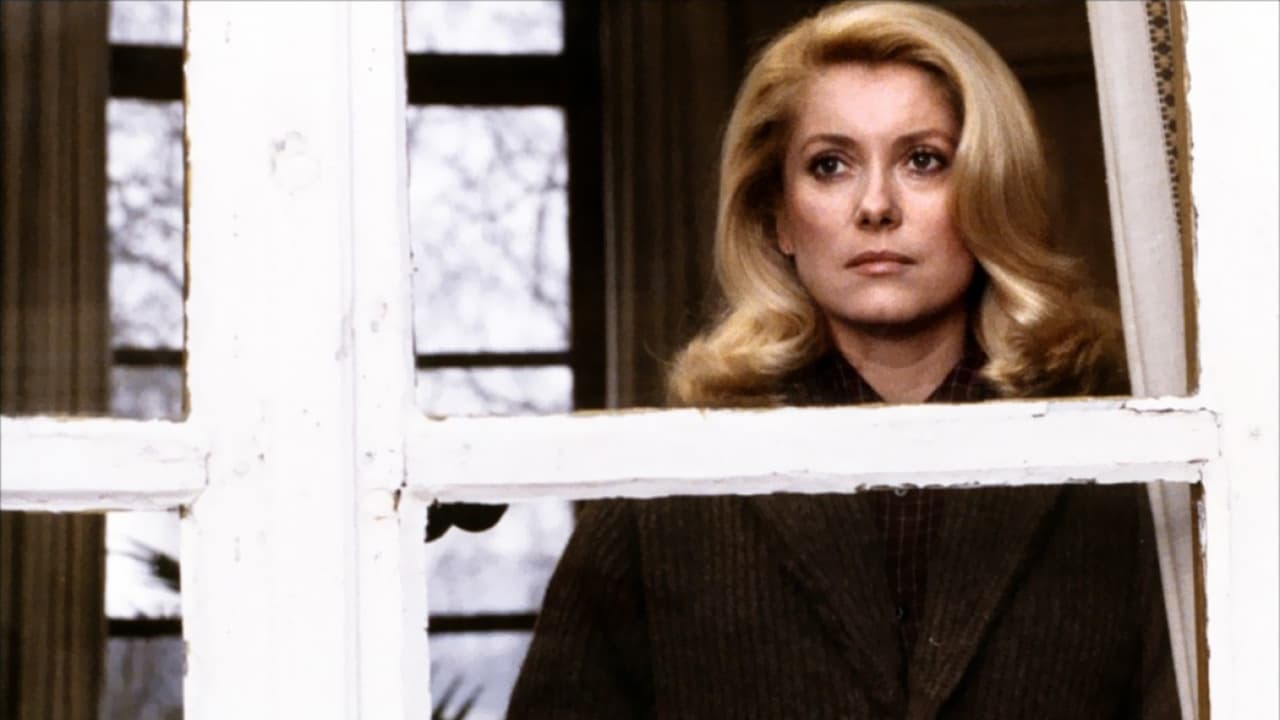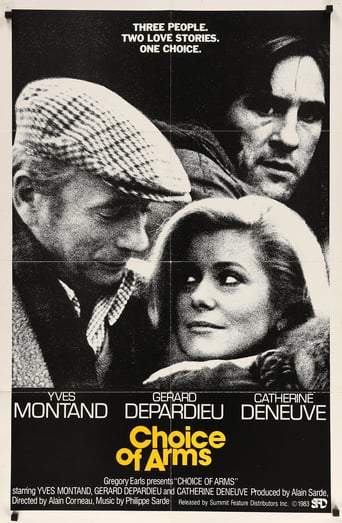

With Melville's death, Tavernier and Corneau became the masters of French film noir, but the latter has the dreamlike mood that the genre really needs to be effective. Le choix des armes has many effective scenes (usually involving either Depardieu or Lanvin) but sometimes leaves us cold. There is a little too much exposition in the storytelling--why show us Montand and his buddy smashing up the gang lord's opulent house when there is no dramatic effect to be gained? Or the elaborate four-way car pursuit (did the budget allow for all those stunt-drivers, so Corneau thought Why not?).The acting is mostly exceptional. The young Gérard Lanvin gives us a very frustrated young detective, Michel Galabru is his burnt-out superior, Richard Anconina plays a man trying to settle down to happy domesticity and failing, and Depardieu is simply great as Mickey le dingue, crazy and moving at the same time. The woman who plays Dany's wife with burning resentment takes over every scene she's in.
... View More2 prison inmates, Mickey (Gérard Depardieu) and Serge escape from jail. After a trap set by other gangsters that leaves Serge badly injured, the two baddies take refuge to Noël Durieux (Yves Montand), a former gangster who leads a bourgeois life by running a stud farm. After Serge dies from his injuries, Noël has the visit of two cops Sarlat (Gérard Lanvin) and Bonnardot (Michel Galabru) who question him about Mickey and Serge and Noël affirms that he doesn't know anything about them. And things take a darker turn for because he believes Noël betrayed him, Mickey gives him a hard time. Noël has no other choice than to eliminate him.As the heir of Jean-Pierre Melville and Claude Sautet, Alain Corneau brought to French cinema a crop of very well controlled thrillers in their writing and shooting. "Le Choix Des Armes" is part of this league and a valuable illustration of Corneau's stylish approach of French detective film. Adopting a rather sparse directing and a tight, parallel editing, the filmmaker takes pleasure in introducing the main characters and as the film progresses to deepen their personality. Like the greatest filmmakers, Corneau has his style and his set of themes. Communication is a recurrent theme in his filmography, especially the difficulties and absence of it. We learn that the cute little girl is Mickey's daughter and he had it just before he was jailed. The two cops work with different methods which doesn't make their relationships easy. Mickey and Durieux are caught in a vicious spiral that is the result of a happy misunderstanding: because Mickey thinks that Durieux gave him to the police, Durieux has to come back to his former gangster life to get rid of his protégé. As they obey to their respective emotions, the two men and especially Mickey get embroiled in a ruthless system that dwarfs them and prevents any reconciliation between them. A permanent feature (the infernal system) that affects the main characters in Corneau's previous films like in "Police Python 357" (1976) starring Yves Montand.This somber story is painstakingly built at all levels from the organization of the scenario to the creation of the sequences. Sometimes, one shot or a few ones are sufficient to Corneau to present us the persona of a character in the film like Dany (a young Richard Anconina)'s dumb wife or the duo of cops between ambitious Sarlat and seasoned, disillusioned Bonnardot. The cast lives up to the demands of the story with Depardieu much better than Montand as impulsive, immature Mickey. Horses in Durieux's domain are an evident symbol. One could also hail scenery discerningly chosen that cement the characters' social position, either it is Noël Durieux's lascivious mansion in the country or Dany's shabby flat in popular suburbs. At that time in 1980-1, rare were the directors who dare to shoot in those high-risk outskirts.This is excellent stuff and it's well known: it's better not to get bogged down in rut. Otherwise, you'll have nothing to say anymore. Thus, Corneau proved his ability at weaving prime thrillers. His next film, "Fort Saganne" (1984) will go in another cinematographic direction: the epic film.
... View MoreA gracefully paced and ably directed work featuring highly talented players, including Gerard Depardieu and Catherine Deneuve, along with Yves Montand, LE CHOIX DES ARMES is generally successful as cinematic art, although it must be stressed that it should properly be viewed in its French language format, since the subtitled American release is harshly cut and reveals post-production efforts not at all sympathetic with the original release. An escaped convict and killer, Mickey (Depardieu), chooses to hide from police pursuit upon the lavish estate of former organized crime doyen Noel Durrieux (Montand) and his wife Nicole (Deneuve, with a wonderfully layered interpretation of her rôle), but when detectives come near, Mickey flees to Paris, although he soon returns, bringing about a conflict between two criminal codes after Mickey believes that Durrieux has informed police of the escapee's location. There are carefully fleshed out parts here for numerous characters as the two principal antagonists career toward an inevitable climactic meeting, it becoming increasingly apparent that there are lessons to be learned beyond those of the scenario and they may not be divulged by ancillary figures. Auteur Corneau's metronomic tone mates well with the script's finely balanced, rather spare, dialogue, and with a complex plot not immediately pervious to a viewer, the film benefits from the director's ability to weave a diverse cast of characters into a discriminatory dramatic construction. Deneuve earns acting honours, while Depardieu is highly effective as a sociopath savaged by paranoia yet displaying a wide range of emotional engagement with disparate characters, and Montand is icily persuasive as a "retired" mob leader who is forced to reenter his past in the hope of achieving safety for him and his wife. Following a slowly gaited but logical storyline is difficult with the extensive cutting performed upon the film's U.S. version, that is burdened as well with poor sound transference and largely inferior processing, very unfortunate in this instance of a solidly crafted motion picture that deserves better.
... View More.. of superlatives. This, the last of the three polars that Corneau made top-billing Montand, finds Montand retired from the mob and roughing it with Catherine Deneuve in a large country chateau where they breed thoroughbreds. Such an idyll can't last, natch, so, before you can say 'make my day, punk', enter Depardieu, hothead extaordinaire, on the lam and looking for a soft touch. Eventually we need the obligatory scene in which the ageing gunfighter dusts off the old six-shooter and wastes the wannabee new fastest gun, except, of course, that this isn't a Western but a very sophisticated and hugely enjoyable polar.It doesn't get any better than Montand and Depardieu (who had worked together earlier in Claude Sautet's 'Vincent, Paul, Francois et les autres' and would do so again in 'Jean de Florette') and with Corneau on bullhorn what's not to like. Post-war French policiers/polars are in a class of their own and provided your nose is in good working order the whiff of cordite can be identified at once as generated by Jean Pierre Melville, Alain Corneau, Tavernier, etc. This one is right out of the top drawer and would BE a top drawer on any screen it graced. Go see! Enjoy!
... View More